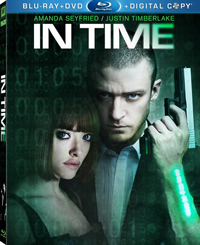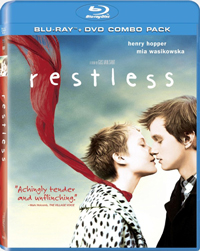In Time (2011)
 Two movies that were still hanging around in theaters just months ago are out now on Blu-ray and DVD.
Two movies that were still hanging around in theaters just months ago are out now on Blu-ray and DVD.
In Time is a sci-fi movie set in a future where humans could live forever if they didn’t have time limits on their lives. Nobody shows outward signs of aging after they reach 25 (which means everybody is young and beautiful — nice demographic targeting!), but a digital barcode tattoo appears on your arm at 25 and starts counting down the time you have left before you expire. GREAT setup.
But what could have been a rumination what it means to experience life and having on the option to live forever becomes something altogether less compelling and more generic. In this world, time literally is money. It’s exchanged like currency and the rich keep raising interest and prices in a Darwinian struggle to maintain their dominance over the poor.
Despite showing promise early on, but In Time doesn’t really have a lot on its mind. Justin Timberlake and Amanda Seyfried become the futuristic Bonnie and Clyde crossed with Robin Hood, stealing time from the rich and redistributing it to the poor. The movie doesn’t ask much of them, acting -wise, as it devolves into a chase film and doesn’t spent any time examining all the thorny moral quandaries that it brings up.
Even Cillian Murphy, who plays a Timekeeper — a cop charged with making sure people stay where their place in society dictates they say — is reduced to simple terms.
This is a real disappointment because the movie is lensed by Roger Deakins (the Coens’ cinematographer, among others) and directed by Andrew Niccol (Gattaca, Lord of War).
In Time has its heart in the right place, but its stiffly acted, avoids tons of promising script possibilities, and has no real urgency.
Restless (2011)
 Restless, however, is a charming weepie of a film that’s equal parts Harold and Maude and Terms of Endearment.
Restless, however, is a charming weepie of a film that’s equal parts Harold and Maude and Terms of Endearment.
Two teenagers, played by Henry Hopper and Mia Wasikowska, fall in love over their shared experiences with death. One is a terminal cancer patient and the other lost his parents in a car crash.
At first, the film seems a bit twee and precious, but it finds its footing as it develops and sheds some of the trappings of the subdued young adult drama.
Director Gus Van Sant has the unique ability to take young people’s inner monologues seriously and present them as capable of deeper thought. In fact, the couple’s ability to see through the way people perceive courageous behavior in the face of death and forge their own path forms the heart of the film. Van Sant respects that, and Restless illustrates that those trappings usually exist only to make the ones who are not sick feel better about themselves.
Restless is at its best when Hopper and Wasikowska are bonding over their matter-of-fact attitudes towards death, but Hopper doesn’t quite have the acting chops of his co-star. Still, Restless is an affecting movie.
The Blu-ray/DVD combo has one of the most fascinating extra features in recent memory. Apparently, Gus Van Sant shot an alternate version of each take after he got what he needed and before moving onto the next setup. The same scenes would be performed again, but this time with no dialogue. An alternate cut of the movie, using these takes, is included as a sort of “silent film” version of Restless.
Hearing sound effects, however, strips this version of Restless of its ability to maintain “silent” status, and the score isn’t used nearly as much as it probably should be. Like some of Van Sant’s more experimental films, it’s an interesting idea, equal parts successful and frustrating.
Read Trey Hock’s review of Restless.








Comments on this entry are closed.